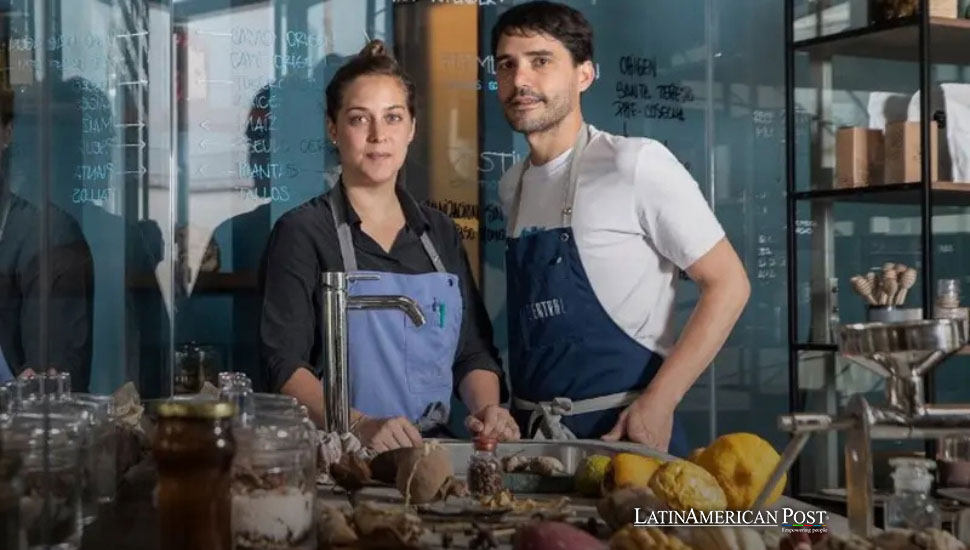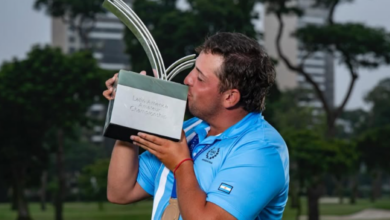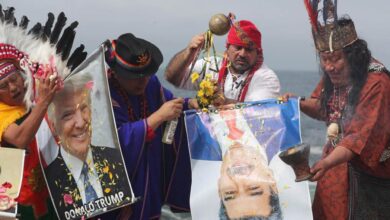Peruvian Chefs Transforming Global Cuisine

Renowned Peruvian chefs Pía León and Virgilio Martínez captivated the audience at the San Sebastián Gastronomika Congress with their culinary philosophy. Rooted in natural ingredients from the Andes and Amazon, their work combines gastronomy, community, and innovative food research.
Elevating Andean Cuisine to Global Heights
The culinary world has witnessed a transformative wave led by chefs Pía León and Virgilio Martínez, whose pioneering approach is grounded in a deep connection to their native Peru. On Tuesday, the couple, who helm several prestigious restaurants, including Central (named the best restaurant in the world in 2023), presented their unique philosophy at the San Sebastián Gastronomika Congress. They transported the audience from Spain to the heart of Peru’s Andean highlands and the Amazon rainforest, offering a glimpse into the sources of their inspiration.
León and Martínez’s philosophy revolves around respecting the environment, culture, and community. Their work is about serving remarkable food and intertwining culinary art with sustainable practices and scientific research. “We believe you can connect with what is truly important to us and our team—our perception of time. The external world is constantly changing, and as a result, we also evolve and mold our lines of work while always maintaining our values and commitment to community,” said León, who was named the world’s best female chef in 2021 and ran Kjolle, another celebrated restaurant in Lima.
At the core of their culinary journey is a strong connection with Peru’s natural landscape and indigenous communities, a bond continuously reflected in their evolving work. Their presentation at the congress gave insight into how their restaurants are more than just dining establishments—they are platforms for research, cultural preservation, and social impact.
León and Martínez are no strangers to international acclaim. At the forefront of their culinary empire is Central, their flagship restaurant in Lima, which was crowned the best restaurant in the world in 2023. Through their work at Central and other ventures like Kjolle and Mil, they have elevated Peruvian cuisine to unprecedented global heights, bringing attention to the country’s rich biodiversity and unique ingredients.
Their food philosophy is committed to Peru’s distinct ecosystems, from the altiplano to the Amazon. They aim to share the stories of the people, plants, and animals that inhabit these regions, creating a culinary narrative that honors tradition while pushing the boundaries of modern cuisine. León and Martínez’s approach to food is deeply collaborative. They work closely with local farmers, foragers, and scientists to discover new ingredients and techniques highlighting Peru’s natural wealth.
One of their most ambitious projects is Mil, a high-altitude restaurant and research center situated 3,600 meters above sea level in the Peruvian Andes. This unique setting provides the perfect environment for them to experiment with Indigenous crops and cooking techniques while fostering relationships with the local Quechua-speaking communities.
Culinary Innovation at 3,600 Meters
At Mil, food becomes a vehicle for exploring the intersection between tradition and innovation. The restaurant is a culinary laboratory where León and Martínez develop groundbreaking dishes based on ancient ingredients and techniques. It is also a center for social and environmental impact. The chefs involve the local population in cultivating the land, ensuring that 50% of the produce stays within the community. The remaining half is used in their restaurants or supplied to other businesses.
This model of shared agricultural production is a cornerstone of their philosophy, blending economic empowerment with sustainable farming practices. This approach strengthens the local economy and preserves biodiversity by encouraging the cultivation of native crops.
León and Martínez are deeply invested in the research side of their work, which goes beyond the boundaries of the kitchen. They have launched 17 research projects at Mil, collaborating with scientists, including botanists and ethnographers. These projects explore the culinary potential of little-known plant species and seek to rediscover ingredients used by indigenous populations for centuries that are largely unknown to the rest of the world.
Botanical Tinctures and Discoveries from the Peruvian Landscape
One of the most exciting aspects of León and Martínez’s work is their development of botanical tinctures. Drawing from the vast array of plant species in the Andes, they have managed to capture the essence of Peru’s diverse ecosystems in liquid form. These tinctures, made from native plants, herbs, and flowers, are used in their restaurants to create vibrant dishes and beverages that reflect the country’s rich natural palette.
Through their Mater organization, an interdisciplinary research center, the chefs work alongside scientists to catalog and analyze these plants, discovering new culinary applications for previously overlooked species. For example, they’ve developed natural gels, thickeners, and beverages from plants that grow in the high Andes, expanding the possibilities of how these ingredients can be used in modern cooking.
This innovative approach to food is not limited to the kitchen. León and Martínez have also begun using natural materials to create their restaurant’s tableware. They’ve initiated a pilot project in which 14 local children are educated in both Quechua and Spanish, and they are actively working on producing all of Mil’s plates and utensils from natural materials, such as cacao bark. They aim to have all their serving ware sourced from sustainable materials within three years.
Nurturing Future Generations Through Education and Sustainability
León and Martínez are focused on their own culinary success and deeply committed to nurturing the next generation of chefs, farmers, and food scientists. Their work with local children is a testament to their belief in the power of education and cultural preservation. By providing young people with the tools and knowledge to understand their environment and heritage, they hope to create a future where sustainable practices are the norm.
This educational initiative is a more significant effort to preserve Peru’s culinary heritage while pushing it into new and exciting directions. Through their various projects, the chefs create a blueprint for how the restaurant industry can play a vital role in environmental conservation and social responsibility.
León and Martínez’s influence extends far beyond the walls of their restaurants. By using food as a tool for change, they are challenging the global food industry to rethink its relationship with the environment and the communities it relies on. Their work has shown that creating delicious, world-class cuisine is possible while prioritizing sustainability and social impact.
Pía León and Virgilio Martínez have transformed how the world views Peruvian cuisine, bringing it to the forefront of the global culinary scene. Their work at Central, Mil, and other ventures has created a model for how food can be a force for good, combining culinary innovation with environmental sustainability and community empowerment. Their dedication to preserving and promoting Peru’s natural and cultural wealth is changing the landscape of gastronomy and providing a blueprint for chefs to lead the way in creating a more sustainable and equitable food system.
Also read: Peruvian Textile Industry Expands in the U.S. Through Fashion Trade Fairs
Their appearance at the San Sebastián Gastronomika Congress highlighted the immense potential of Peruvian cuisine, and their continued work promises to inspire chefs and food lovers worldwide for years to come. As they continue to explore the rich biodiversity of Peru’s landscapes, León and Martínez are proving that the future of food lies in the past—rooted in tradition but reimagined for a better tomorrow.





